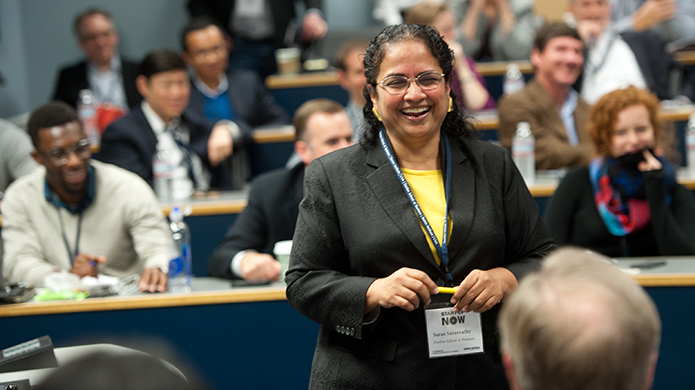VOLUME VII – CHAPTER 4
SET MILE STONES
MILESTONES ARE NOT SET BY WORDS

In 850,000 Sq.ft. Apple campus – no allowance is given for any excuses or explanation – No alibi for mistakes and failures. In an article on ‘Fortune’ Adam Lashinsky quotes an incident when Steve Jobs addressed new Vice Presidents on their promotion to that post. Jobs said “If the garbage in my office is not emptied regularly for some reason, I would ask the Janitor. He could reply saying, “well, the lock on the door was changed and I couldn’t get a key.” This though an irritant, it is an understandable excuse for why the Janitor could not do his job. As a Janitor, he is allowed to have excuses. But somewhere between the Janitor and the C.E.O. reasons stop mattering. The Rubicon is crossed when you become a V.P., “You have no excuse for failure; you are now responsible for any mistakes that happen and it doesn’t matter what you say.”
Now we can understand how Steve Jobs could become so successful. He did not believe in running a distance but he wanted to create milestones – Bench marks of success. This requires certain steps to be taken, certain principles to be followed, certain standards to be maintained, certain values to be upheld.
Donald Trump’s warning is a point to be noted by you.
“In the end, you are measured not by how much you undertake, but by what you finally accomplish.”
Ramachandra Babu, the famous cinematographer told his son:-
“Once a shot is made, it is History. The flaws are there to haunt you for years to come.”
A senior teacher known to the author left his old school and went to a far off place as Headmaster of a different school bragging that the management had hired him for his intelligence, experience and expertise. But at the end of that year he was fired for his lack of emotional intelligence. The milestones he spoke so much of establishing – All became a distant dream!
A person who sets milestones has a high degree of self awareness, self regulation and empathy. There should be perfect sync between his word and behaviour.
He must be aware of how he is seen by others. He must think more clearly and better be able to assist his staff to stay clear and focused as well.
ARE YOU MANY IN ONE?

A Principal who sets mile stones first starts with a positive statement about a teacher, then points out a specific weak link in his teaching – specific enough for the staff to know what to do about, then suggests how it could have been done better or could do so next time and also pats him with an encouraging word.
The best leaders use many styles just like a golfing pro uses different cubs, depending on the situation.
An authoritative leader like Mr. K. Rangaswami lengar mobilized people to ward a vision.
Affiliative leaders like Sri. S. Balakrishna Joshi created emotional bonds and harmony.
A Principal who sets mile stones considers pedagogical Leadership as his “Calling.” He asks the staff, “Why do you want to lead the life you are leading when it is in your hands to lead the life you desire to?”
The Author’s admiration and respect go to the Education Superintendent of the Lakewood County in Denver, Colorado, U.S.A. with whom he had spent the whole of January, 1962. He served the Principals and Staff of his County Schools as a Consultant, Counsellor, Clearing House, Quality Controller, Adviser, Friend, Guide and Leader. He suggested to the Board that the Libraries of all the schools could be interlinked so that all schools can share all the resources. He also suggested that the best practices in each school (each class & each subject) can be shared among themselves periodically.
The Author implemented theses ideas during 1979 – 1981 when he was the Education Officer, Madras Region. During the summer courses the teachers were asked to share their successful techniques. The schools were asked to circulate list of their Library books to all schools in the Region so that any teacher can borrow a book he wants from any school.
Sri. Subramaniam, Librarian of K.V.-IIT and Mrs. Radha, Librarian of K.V., Coimbatore prepared lists of Curriculum Materials available in the Library for each lesson in each subject in each class with the help of some bright senior students. A Laborious Task done with patience as a “Labour of Love.”
The Dell Computer Co. used to say: “Parts are ready. Your Computer will be got ready as per your requirements & specifications.”
Sri. Subramanian and Mrs. Radha did exactly that. Books, Magazines, Journals, Newspaper Articles, Pictures, Posters, Advertisements, Pamphlets, Photos, Picture Post Cards and so many were collected by them and arranged to the relevant lessons and put in a container and kept ready for use by the teachers. These two Librarians understood the author’s description of the Curriculum Materials Lab he saw in the Ohio State University and the Ball State University in U.S.A. and the International School at the Aurobindo Ashram, Pondicherry. Based on this idea the author has developed a Social Studies Lab in the Teachers College of Sri Ramakrishna Mission Vidyalaya, Coimbatore.
ADD BEAM, GLEAM, SCHEME AND TEAM

A Principal who sets the milestones develops the following attributes in his students and staff:-
- Analytical Skill Set
- Understanding Team Work & Leadership – Make it
- Provide value loaded Education.
- Inculcate a perspective and a problem solving orientation.
This aspect of a Principal’s work the author saw in action in the following schools:-
- York Public School – York, UK
- Bronx School – New York, USA
- Ridgewood School – Chicago, USA
- Myersgrove School – Sheffield, UK
- A School in Amsterdam – Holland
- A School in Geneva – Switzerland
- Burris Model School – Ball State University – Muncie Indiana,USA
- Lake Wood School – Denver, Colorado, USA
- Countesthorpe School – UK
- Rishi Valley School – Madanapalle, AP, India
- Shreyas – Ahmedabad
- Spring Dales – New Delhi
- Sri Ramakrishna Mission Vidyalaya High School–Coimbatore-20
- The Basic Education School – T. Kallupatti, Tamil Nadu.
- The Blue Mountain School – Ooty
- The International School, Sri Aurobindo Ashram – Pondicherry.
The Author had tried to introduce these in all the five Kendriya Vidyalayas he headed and as Education Officer he tried to motivate several Principals to adopt them. The author has strongly believed in five things:
- Whatever we do in life we must excel
- Education Management is not just teaching but creating thinkers.
- Basic principles of Education Management is Be-friendly, Be- frank, Be-fair and Be-firm.
- Education Management is not just schooling the child, but helping the child to Scout into his own Genius.
- Have a dream (a creative thought)
Then add beams – processes
Then add gleam – polish
Then have a scheme
To make this scheme a success is build a team.
The Principal who wishes to set Mile Stones has to bear in mind the Physics principle called the “Doppler Effect” – “An apparent shift in frequency for a sound wave produced by a moving source.” When an Ambulance Car approaches you its siren sound is high and as it passes the pitch of the sound dies down. Using this example Kalyan Sagar Nippani cautions you in his book, “Winning without Running” that unpleasant events in life may often have an increasing impact on your mind. As they approach you, if you start brooding over the consequences of that event, then they may be more disturbing and distracting than they really are. Kalyan Sagar wants you to remember the time when you got a tooth extracted. Once you reach home you don’t think again of the pain that you experienced at the time of extraction.
The Milestone Principal just approaches and tackles situations as they are and as they come up. He thinks only of the ‘Here and Now’
For the milestone setting Principal Prof. Kitu Reddy of Sree Aurobindo Ashram, Pondicherry has a few mantras to manage himself first before trying to manage others.
a) Fix one aim for yourself
b) Develop awareness – Himself and staff
c) Learn to shift levels of consciousness
During the day talking to a staff, a parent, a student requires different mind sets.
d) Integration of being. Your word and action must be in sync. You should exhibit a complete personality – no Jekyll and Mr. Hyde business.
e) Right attitude – have a positive attitude towards people and
f) During the day, preferably before going to bed, go within yourself through meditation.
This Milestone Principal will make his students understand how India’s growing technological connectivity is helping to improve rural development, like a fisherman knowing in advance through SITE (Satellite
Instructional Television Experiment), when it is dangerous to go fishing. ‘The non-clonable ID technology developed by a Pune based company provides fool proof anti-counterfeiting solutions to the agricultural, Pharma and Currency sectors. The Chotukool, Nano fridge developed by Godrej Boyce, the washing machine that can work without electricity developed by a Kerala School Girl – the clothes are washed while she pedals away. More examples liked this as food for your thought you can get in “The India Idea” by L.K. Sharma.
COME TOGETHER; KEEP TOGETHER AND WORK TOGETHER

The Milestone Principal will understand that speech management has got a lot to do with leadership. That the interconnected features such as voice quality, loudness, intonation, rate and rhythm will greatly influence his communication. He will avoid poor diction, inappropriate use of words, speed, slow delivery, incorrect intonation, too loud or too low pitch and non-verbal communication.
He will have clarity of thought and increase his acceptability by a good prior preparation. Use the correct visual and verbal cuts, practice before delivery, make the right emotional contact, ensure that his body language is in tandem with his expression and also listen intently to what others say on the issue at hand.
His source of reference will be himself. He will be able to distinguish clearly between what he should do and what his conscience says is the right thing to do. “He has a clear frame of reference – integrity, Involve and collaborate” as Kaushik Gopal, an organization consultant says.
He will help his senior staff to transition effectively to the next level of “Leadership” cross road transition” as it is called by Sreekanth K. Arimanithaya, Chief of HR in Brittania Industries. He remembers Peter Drucker’s caution and knows not only what to do but also what to stop, when and where.
He knows that his role requires a change in relationship, tasks, perspectives, beliefs, knowledge, skills and abilities. Gene Dalton and Paul Thomson have developed a four stage career model and call this transition as ‘Novation.’ This has to come from within you.”
He is not the one to proffer excuses. He gets up every day feeling that he is going to achieve something that others even fear to think about.
He makes his staff realize that when they feel thrilled by what they are doing they grow, they flourish, but when they make their job a handmaid, a tool for their personal greed, they will wither away.
He follows the prescription given by Scott Keller and Coling Price of Mckinsey and Co. to nurture the health of an institution.
- Direction – he knows where he wants to take the institution and how to lead his team to that promised land.
- Leadership – ability to motivate and take the team with him, leads from the front.
- Culture: Establishes an ethical work culture that believes in sharing knowledge.
- Accountability: Helps each staff clearly understand what is expected of him. Gives freedom of decision – making and also fixes up responsibility for delivering results.
- Co-ordination: Ability to inter link the skill sets of staff and act as a hyphen that joins and a buckle that binds them.
- Capabilities: Possesses skills to guide each staff in his work, to help the institution to have an edge over other schools.
- Motivation: Be self motivated and inspired. Ability to ignite the spark of genius in every one. Talent to tap the talent in others and help them to discover it themselves.
- External Orientation: Has a high emotional intelligence and excellent human relations. People love to work with him and for him.
- Innovation: Is an idea generator. A power house of new ideas. A creative thinker. Prods the staff and students to ask why and why not.
In KV.s, in the period of the first Commissioner Sri. L.O. Joshi, I.A.S. it was a Leadership given organization. He built up the organization and laid solid foundations.
Sri. P.R. Chauhan, Commissioner gave importance to perfect execution.
Miss. Ahalya Chari, Commissioner focused on Academic Excellence – A Knowledge Organization.
Mr. Mathur, Commissioner on Human Relations, Mr. Baldev Mahajan on Staff Development, Mr. Khare, I.A.S., Commissioner, K.V.s, focused on the Expansion (starting more K.V.s). Instilling discipline and outsourcing certain types of work – Market focused.
The Milestone Principal knows the meaning of Henry Ford’s dictum:
Coming together is the beginning
Keeping together is progress
Working together is success.
He puts in place a talented team. Helps them bind and bond and inspires them to mesh well and work like the Bees. He motivates the staff to the highest level of achievement and gives them an opportunity to grow. He makes them understand that knowledge is more important than capital, that work is more important than managing, that action is more important than vision and that institutions are more important than individuals.
THE PUPIL INSIDE THE PRINCIPAL
AND THE TEACHER INSIDE THE PRINCIPAL

Disney’s great contribution was the company “Walt Disney.” He had the ability to build, never stopped and never looked back. Your school must be your greatest contribution.
Two passages in Sri Rudram can be aptly applied to such a Principal.
These Slokas stress the fact that the Teacher is also in the form of the Pupil. He is inside the pupil and makes him work out his plan in the same way.
The Milestone Principal never fails to count and congratulate even the smallest contribution made by any staff irrespective of the rank. Remembers Lord Rama’s compassionate stroking on the back of a squirrel which went on bringing its mouthfuls of sand and putting it into the sea-as its contribution to the building of the Sethu – statistically it may not be significant but the genuine intent behind the effort is worth its weight in gold. A Peon may be just a ‘Squirrel’ in the ‘Satisfaction Bridge.”
In 1970 when the funds were raised for the construction of the Vivekananda Rock Memorial in Kanyakumari, Rupee one paper brick coupons were given to the students to collect as many bricks as possible. Within a month on the last day a IV class girl came to the Author and said, “Sir, daily my father (Airman) gives me ½ Anna (6 Nayapaise now), I saved for 31 days – 15 ½
Annas & my mother gave me ½ Anna. Thus I could save one Rupee to buy just one brick only. Will you please take it.” The author shed tears, took that collection of 64 quarter Anna coins put them on his eyes and said, My dear child, you have not given one brick, you have given 192 bricks. Your every paisa is equal to one rupee. Your brick shall be the foundation stone on which Swami Vivekananda’s statue will stand.
She rushed out to her class and told all her friends, “Swami Vivekananda’s statue will stand on my brick. Our Principal told me.” What Joy! What satisfaction! What delight in that young mind!
Due to rationalization and reconfiguration of the number of classes, one section had to be removed for the next year. Because of that, two teachers (newly appointed) had to be discharged. One of them was recently married and other had to support his parents being the only son. When the news was broken, both were shell shocked, suddenly their lives lost all meaning. They were frozen in belief. Is it a dream or a fact? They asked themselves. This is the first stage of grief.
Next was the stage of “anger and betrayal” – angry with the author that he had betrayed them fully knowing their condition.
Then they reached the third stage when they calmed down and requested the author to plead with the Asst. Commissioner on their behalf. They said they were prepared to work for a reduced salary. This is the stage of ‘Bargaining’
When this plea was not accepted they went into a state of ‘Depression’ – complete emptiness crept in and grief entered their lives.
The final stage was acceptance, when they understood that the order was final. They reconciled with their fate and then asked the author what will be our future which appears to us very dark?
Then the author said, “You have been with me for one year. Do you think I will leave you in the lurch knowing your condition? During the last one month I have been speaking to a few correspondents and finally I could get you into two schools, of course not at KV scale. But slightly reduced, from tomorrow you will be working there. You will come to school tomorrow morning and after assembly I will personally take you to those two schools and introduce you to the correspondents.”
They simply stood still-dumb founded. The author hugged them and wiped off their tears.
If you want to know more about these five stages through which a retrenched staff will go, you may glance the pages of “Riding the Tiger” by Priscilla Nelson Ed Conan.
ARE YOU A ‘WITH’ OR A ‘WITHOUT’

A Milestone Principal thinks deeply about the development of his staff, what kind of training, how much of it should be given, when it should be given and where it should be given – all those aspects he thinks before the summer. Inservice courses start when the lists of participants are sent to the schools. The author used to ask each teacher to inform what aspects he/she would like to be included in the training programme to make it useful to him/her. Based on these inputs the author used to sit with the Directors designated for the courses and plan the agenda for 21 days so that each one is benefited.
He used to include four factors in each training program viz.:
- Leadership Training.
- Diversity Training – As the course will have staff from different
- Team Training – Practice for working in groups.
- Virtual Training – Training in use of A.U. aids – (computer for teaching).
In all these programs the author stressed the “Learn ability” factor-The capacity of the staff to absorb and transmit to the pupils.
The Milestone Principal never gets too big for his boots. Instead of adopting a directorial air or a resource person’s halo, the author used to become one of them during discussions on group work. This loosens their nerves and makes the flow of the communication easy. In these programs the author used to help the staff evolve learning circumstances for their students.
The Milestone Principal will never say, “I can’t live with them.”
But always says, “I can’t live without them.” He never lets down his staff at any time. During 3 day inspection of a school by the Asst. Commissioner and the author, on the second day evening a group photo was taken. When the teacher- photographer showed the photo next day to the Asst. Commissioner, she fumed at the photo and said, “I can’t believe it. The last time I posed for you, the photo was superb.” Immediately the Principal intervened and said,
“Oh! Madam, but you should remember that this teacher was six years younger at that time.” That softened her.
In 1979 when the Author took charge at KV, HVF, Avadi, there were three new teachers recruited that summer only. During his rounds he saw these teachers sitting morose in the staff room for the first two weeks. He asked Sri Reddapaji, PGT (English), a Senior Teacher to talk to them. He reported that they were worried about their performances. At once the author remember what he had read in 1977 September-an article by Mr. Rudy Webster-a Sport’s Psychologist as to how he took care of Viv Richards, quite talented but then a new player in the West Indies team. There were high expectations about him. But he played poorly in the first few tests and was almost dropped from the team. However much he tried he couldn’t understand what was wrong with him.
Webster noted that this nervousness turned into ‘performance anxiety’ – A Big Bottleneck for any achiever. This stiffens the body. Disrupts motor skills and messes and confuses thinking, robs self-confidence and leads to loss of focus.
Like Webster did, the author took charge of those three, asked them to come to his room after school hours for a week and over cup of tea and snacks told them, “How to relax, calm their minds, simplify their thinking. concentrate only on the present.” They were asked to repeat to themselves, “I can” to build self confidence. He asked them to observe his class and also took them with him to observe the classes of Senior Teachers – how they come to the class well prepared, have an easy going friendly relationship with the students, how they allow pupils to ask questions, how they make them quite interactive and above all how they were not at all conscious that they were ‘teaching.’ They simply enjoyed being with the children. He advised them not to be over whelmed by pressure of excellent performance in the first year itself. He said, “I have also been like you having all these teething problems. Don’t worry about the future. Concentrate on the present and give your fullest to each class. As they say in cricket, play one ball at a time. Focus on the eyes of the students. They will tell you so many things. I am sure you all going to become Principals after some time. I look forward to that day.”
Now all three of them are Senior Principals passing on the same advice to the new recruits in their schools!
Catch a copy of Dr. Rudy Webster’s recently published book, “Think like a Champion” – You will get many useful tips about the handling of freshers.
BECOME A MATERNAL UMBRELLA

A concert is as good as the symphonies. An orchestra is as good as the conductor. A conductor is as good as his orchestra (synergy).
Concert – School
Conductor – Principal
Orchestra – Staff
Milestone Principal acts as a good conductor.
A School of fish swim together in the same direction, until it senses danger. Within seconds the entire school turns and speeds in the opposite direction.
This Principal changes and adapts his team according to the changing scenario and makes them function within a matrix of responsibility, authority and accountability. He moves the staff from a melting pot assimilation culture to a salad bowl concept.
This Principal follows two dicta;
Dictum I – The way to success is to always have unfathomable wisdom and an unfailing way.
Dictum II – Those who win over 100 conflicting situations, use strategy to bend others without getting into conflict.
He moves the staff from something familiar to the unfamiliar. He helps them become something different from what they are – something they could become.
He knows that between life and death there are time and space and every moment of this he should mark by his life. When you hug a baby you move from the past to the future through the present. This movement is a continuum. So also he feels the same way when he is with his staff and students.
When one thinks of his mother he does not see but feels the supreme sense of compassion, comfort, concern, the warmth of protection, the avalanche of affection. It is emotional and not visual.
So also when the staff and students think of their Principal, they should have the same emotion, the same feeling of a maternal, umbrella.
~~~~~
ONE WHO KNOWS (VOL VII – CHAPTER 4)
– Dimensions of the Life and Work of a Principal –

679) One who warns his staff that even before they say something is not possible, they will be told by another – Hey! I am doing it!
680) One who firmly believes that in joy or sorrow, in tears or smiles, he can always find, “HIM” near him.
681) One who knows that his knowledge helps him to make a living, while wisdom helps him to make a life.
682) One who knows that he is safe, when his conscience reproaches his ego and he follows the former’s advice.
683) One who knows to realise the potential of his mind by means of his introspection, developing self-confidence and controlling his mind.
684) One who knows that his opinions should count and influence.
685) One who knows to seek gold in his people and feel happy that they turned out to be gold nuggets.
686) One who knows to relate his staff easily and with warmth.
687) One who always tries to narrow the gap between expectations and reality.
688) One who knows that the passive way is to keep complaining about people and situation and avoiding the active and creative way of understanding and reaching others.
689) One who knows to actualise and maximise his potential.
690) One whose positive dissatisfaction eggs his staff to go beyond.
691) One who does not pamper his staff with gentlemanliness.
692) One who always, “Upgrades” his expectations.
693) One who always tells his staff:
“What more can I Do
What else can I Do
How else can I Do”
694) One who is dissatisfied with what has been done compared to what is to be done.
695) One who knows where he is and where he wants to be.
696) One who is satisfied that he is happily dissatisfied.
697) One who remembers Albert Bandura’s Social Learning Theory that four steps or conditions must be met for.
For observational or social learning to happen:
a) Attention:
To be a worthy Role Model;
He has to be careful about what he thinks, speaks, acts and lives.
b) Retention:
Make learning a joyful experience.
c) Reproduction:
Physically and intellectually capable of producing the act.
d) Motivation:
Our actions should serve as a positive motivation.
698) One who:
Can step into others’ shoes
Celebrates his life with dignity and self-esteem
Is committed to what he performs
Gives his best for every work
Believes in his ability to be the best
Is grounded
Loves to learn
Practises truth
Is intense in everything he does
Is always smiling
Feels self-worthy
Treat success and failure with equanimity
699) One who can decide to be cheerful, give a positive lift to your life-put
it in perspective and count your blessings.
For that, he asks himself:-
Can you be alive?
Are you healthy?
Are you related well to others?
Do you belong to your family?
Are you engaged in work?
Can you be proud of some achievement?
Do you have a goal, an ambition?
Do you have a plan for your improvement and success?
Do you have real good friends?
Do you have any worry about finance?
700) One who knows that
The past is History – has to make peace with it
Today is a new story – has to enjoy it
The future is a mystery – should not fear or worry about it.
701) One who knows to overcome the temptations:-
a) To be greedy
b) To give in to lethargy
c) To give free reign to temper
d) To lose patience
e) To be unforgiving and in considerate
f) To be judgemental on others
g) To resist change
h) To blame God
i) To complain and criticise.
j) To buy things on impulse.
k) To be negatively inclined
Knows to avoid all these and make the school a heaven.
702) One who knows that:
a) Feedback should be given to improve a person and not to point at his
mistake.
b) Communication gaps occur because we communicate to an unprepared mind.
c) Intentions should be genuine.
d) Motive must be to make a difference.
e) He should forgive those who are unreasonable, irrational and selfish
and self-centred.
f) He should be kind to those who accuse him of selfish and ulterior motives.
g) He should succeed anyway even if in that process he can win some genuine enemies and unfaithful friends.
h) He should be honest and sincere, even if people deceive him.
i) He should be creative anyway, even if other destroy-overnight his years of work.
j) He should be happy anyway, even if some are jealous of his serenity and happiness.
k) He should do good anyway, if the good he has done has been forgotten.
l) He should give his best anyway, even if it will never be enough.
m) It is, in the final analysis, between him and God and not between him and them.
Adapted from –
“The Paradoxical Commandments”
By
Dr. Kent M Keith
703) One who tells his staff that their teaching should be an invitation to awaken the genius in the child and call them cheerfully face the new born vibrant day.
704) One who knows that as the school life ends for the final year students, he should see that they leave fully dressed up with intelligence and skill and herald their entry into the world in all full moon splendour.
705) One who requests his staff to welcome the stripling, enthusiastic, bubbling children wearing an innocent air without worry or care just like the early morning, who come in to enliven their spirits.
706) One who advises his staff to make the students revere their mother who has a youthful exuberance, straddles her chores cheerfully, has an elegant demeanour has strong will power bubbling with energy, resolute in her decisions and has an organised approach.
707) One who knows that sometimes comfortable silence helps in bettering good relationships.
708) One who reminds his staff the words of Lyman Abbott:-
“Every life is a march from innocence through temptation
to virtue”
709) You want to go up, but something stands in the way. You have to give it up, to move higher. One who knows this and gives up that blocks his progress.
710) One who knows that sometimes the silence of the tongue leads to the silence of the mind and makes silence and stillness a part of his daily routine.
711) One who knows that humility and love shall be his two arms to embrace his staff.
712) One who knows to accept all that came his way and rejoice in all that happened.
713) One who knows that when his work and its results become useful to the world, he has discovered the purpose of his life.
~~~~~
EMINENT THINKERS (VOL VII – CHAPTER 4)
(Whose ideas have been adapted for Education Management

Prof. Saras D.Sarasvathy
469) John Gottman
470) Prof. Bryanl Bonmer
471) Paul Smith
472) Prof. Saras D. Sarasvathy
473) Jean Francois Gravelet-Charles Blondin
474) Dhirubhai Ambani
475) Mukesh Ambani
476) Toyota, M.D.
477) Bjorn Borg
478) Shika Sharma
479) Suresh Krishna
480) Michael Madone
481) Reto Wittwer
482) Bala Jayaraman
483) Ashok K. Banker
484) Anu Kumar
485) Manjin Gokhale Joshi
486) R.S. Sugirtharaja
487) Mc. Arella
488) Douglas Adams
489) CNR Rao
490) Daniel M. Mc. Gunn
491) Lucia Capacchione
492) Ashwin Sanghi
493) Sunil Dalal
~~~~~
WE have to pay attention to the plans that intelligence dictates, not to the external signs of orthodoxy. A person may appear strictly orthodox, but his heart may be filled with the poison of hatred and envy. Has he realised that God is the God of all, that He is present in every being “Sahasraseersha, Sahasraksha, Sahasrapaad”, (thousand headed, thousand eyed, thousand legged) as He is? – Bhagawan Sri Sathya Sai Baba




